#shakespearean heroines
Photo
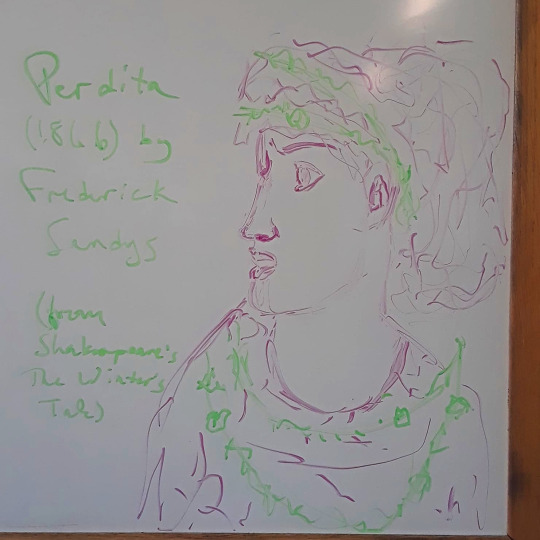
A half-assed whiteboard imitation of Frederick Sandys’ Perdita (1866), done in a few minutes in Expo marker on 2/14/2023
#my drawing#visual art#2023#pre-raphaelite#frederick sandys#shakespeare#the winter's tale#perdita#artists on tumblr#shakespearean heroines#i did this on the same board i've done my other whiteboard drawings that i've posted#idk if i've mentioned this. but it's in the math tutoring center where my sister works lol#i haven't been there in two months. i don't take any math classes anymore so i'm really just chillin in there. sometimes i socialize#sometimes i do my own studying. that's how i started these expo marker drawings. is that i was looking at paintings for inspiration for my#figure drawing final. and id do a sketch in my sketchbook and then copy it from my sketchbook onto the board. and id leave em there#obviously nothing about that is against the rules even if that's not what that room is *for* ... im allowed to just kick back#i always wondered what the other ppl who work in there thought of my whiteboard drawings. bc id leave em up. and sometimes they wouldnt be#erased for like a week or two. hell. the last one i posted (the love potion by evelyn de morgan) was my least impressive imo#but it was only erased like a week ago. it stayed up for like 2 months. kaily told one of her coworkers he could erase it and he was like#'its been there since last year... and out of respect for that i will not be the one to do it.'#lol like they're nice but they're not sacred#but anyway i went at a different time of day and stayed in there for several hours just reading and drawing while other ppl did math#i met three other ppl who worked there that i'd never met before. and they were all like 'oh are you kailys sister who does the drawings?'#i guess some of them really like them lol. it touched my heart#one guy in his 40s also saw i was reading a book on john donne & was pretty interested in that combined w my choice of the winter's tale#i guess he's a bit of an early-modern english lit buff himself. he's a christian. he said he liked george herbert.#he said smth to another student like 'yeah you can do math in here. or you can. draw on the board. or read books about#sixteenth century poets and theologians. whatever you want'#i didnt know anyone there would actually be impressed w anything i do. since it is not stem-related at all.#i guess i bring that old school humanities swag to the math center hahahaha
10 notes
·
View notes
Text
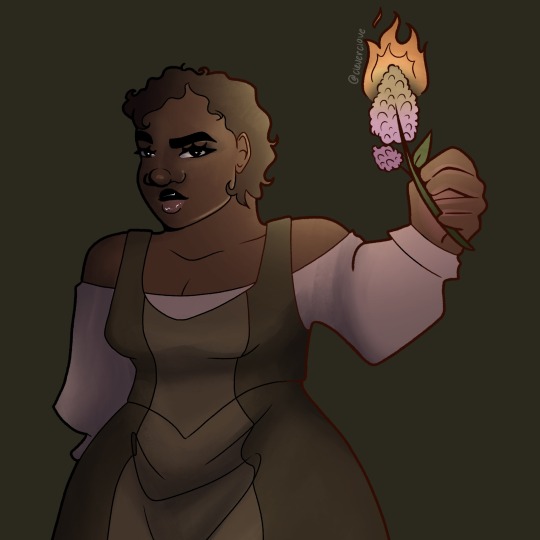
Withered lilacs
[Image ID: Digital art piece of Ophelia from Hamlet. Her hair is cropped short and she is carrying a burning lilac with a smile on her face. One eyebrow is raised. /End ID.]
#ophelia deserved a villain arc 1000%#my little arsonist corrupted shakespearean heroine ✨#my art#digital artists on tumblr#digital art#hamlet#ophelia#shakespeare
25 notes
·
View notes
Text
proud product of the default male character casting at an all girls school to masc lesbian pipeline
#got told by my beloved drama teacher that i had a real knack for playing shakespearean heroines who disguised themselves as men#like okay that compliment was actually really dear to me but also you could've just called me a dyke and left it at that#alex talks
5 notes
·
View notes
Text

Helena from “All's Well That Ends Well”, act 2, scene 1
— William Shakespeare
#shakespearean comedy#william shakespeare#quote#all’s well that ends well#quotes#plays#shakespearean heroine
10 notes
·
View notes
Text
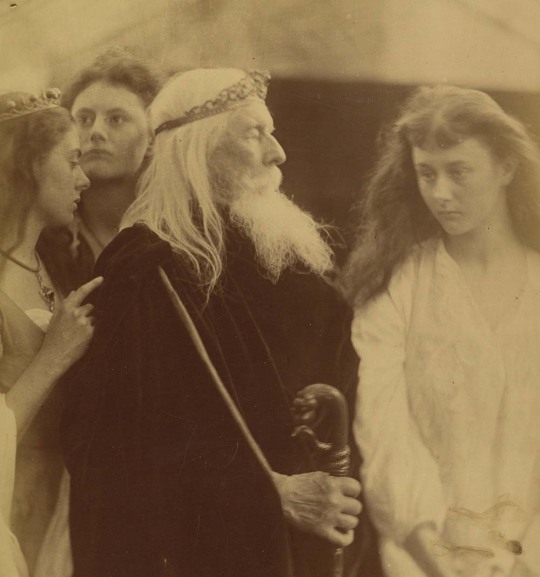
King Lear Alotting His Kingdom to His Three Daughters, by Julia Margaret Cameron, 1872. The Metropolitan Museum of Art, bequest of Maurice B. Sendak, 2012.
---
The Liddells never returned to be photographed by Carroll, but the sisters reappeared a decade later before Julia Cameron’s camera. Alice, Ina, and Edith posed for Cameron’s complicated tableaux vivants as Roman goddesses, literary heroines, and Shakespearean stories. In one photograph that typifies Cameron’s work, Alice and her sisters pose with her husband, Charles Hay Cameron, enacting a scene from King Lear. Charles plays the role of King Lear while the Liddells pose as his three ill-fated daughters, Ina’s index finger poignantly laid on his shoulder while Alice, hair down, fixes her gaze outside of the photograph’s frame, a look echoed by her younger sister Edith.
#shakespeare#william shakespeare#shakespeare on film#alice liddell#alice's adventures in wonderland#alice in wonderland#photograph#photogaphy#julia cameron#lear#kign lear#cordelia#goneril#reagan
115 notes
·
View notes
Text
I've been thinking of the idea that Jane Austen might have been partly inspired to create Elizabeth and Darcy in Pride and Prejudice by Beatrice and Benedick in Much Ado About Nothing.
@anghraine has posted repeatedly about how P&P can almost be read as a then-modernized retelling of Much Ado, like Clueless is to Emma. Not only because of the Beatrice and Benedick/Elizabeth and Darcy parallels, but other details and character parallels too.
If Austen really was inspired by Shakespeare in this case, then I think she deserves praise for one thing that isn't often mentioned: that in writing her Beatrice and Benedick-like couple, she also wrote counterparts of Hero and Claudio, but she handled them in a way that's much less... divisive (to put it nicely) than the always-difficult Hero/Claudio storyline. Namely by dividing Hero and Claudio's role in the plot between two couples: Jane/Bingley and Lydia/Wickham.
The parallel between Jane and Hero is more obvious, since Jane is Elizabeth's sweet, innocent, most beloved family member just like Hero is to Beatrice, and since like Hero, she temporarily loses the man she loves because he's led to misunderstand her, which makes Elizabeth, like Beatrice, beside herself with rage. (If she could, Elizabeth probably would eat Darcy's heart in the marketplace after she learns he convinced Bingley to leave.) But instead of being melodramatically tricked into thinking Jane is sleeping with another man, Bingley is only led to think she likes him as a casual acquaintance but no more, and instead of taking her to the altar only to publicly shame and reject her (which would be a ridiculous thing to do for the mere "crime" of not feeling romantic love), he just quietly leaves the neighborhood without proposing or confessing his love to her, and without realizing the pain it causes her. This makes it much easier to root for Bingley to reunite with Jane and finally marry her than it is to feel the same way about Claudio.
But of course Hero's public shaming does more than break her heart: it also threatens to ruin her reputation forever, and her family's too. Austen also places her heroine's family in this type of danger, and just like Shakespeare did with Benedick, she has Darcy's efforts to set things right be the final stroke that brings the two formerly-battling love interests together as a couple. But thankfully, instead of tainting Jane and Bingley's sweet little romance by having them be the source of the near-disgrace, she has Lydia run off with Wickham. Effectively, her solution is "What if Beatrice and Hero had another young female relative, and instead of tricking Claudio, Don John straight-up seduced the third girl and that was the cause of the family's shame?" And instead of challenging Wickham to a duel, a la Benedick with Claudio, Darcy simply pays him off to marry Lydia: a choice that's telling about the difference in time, place, and genre between Austen's realistic, satirical portrayal of Georgian England and Shakespeare's portrayal of Renaissance Italy. (Austen furthers this point when Mrs. Bennet convinces herself that Mr. Bennet will duel with Wickham over Lydia's honor and panics at the thought, only to seem disappointed when he doesn't.)
I don't know if Austen consciously drew inspiration from Much Ado when she wrote Pride and Prejudice or not, but if she did, she made some clever character changes that suit the differences between a slice-of-life Georgian novel and a Shakespearean stage comedy.
#pride and prejudice#much ado about nothing#jane austen#william shakespeare#elizabeth bennet#beatrice#fitzwilliam darcy#benedick#jane bennet#lydia bennet#hero#charles bingley#george wickham#claudio#don john#comparison
1K notes
·
View notes
Text
The Course of Love: Professor D./Reader (Resident Lover) [Snippet]
When one misstep from Cassandra leads to her opting out of the school play to you preforming as the lover for the world of theatre, you find yourself dressed beside Professor Dimitrescu, awaiting the curtains to reveal the light.
OR: You are Romeo. She is Juliet—and your professor.
You know all too well that Cassandra, daughter of the Professor Dimitrescu and star of Mother Miranda All Girls' University, can be quite the—
"Yea, noise? Then I'll be brief. O happy dagger!" Juliet's finger curls over the pommel, releasing the weapon from the deceased Romeo's belt; the first for a fair girl. "This is thy sheath;" She lifts the dagger and points the blade to her chest, thrusting in with the carry of a sharp gasp. "there rust, and let me die." She mutters her final words to the audience, dramatically so for the effect, before joining the body that lays beside her. The death marks the end of a young love that how so appealing, would so too be pronounced guilty on six charges (With one manslaughter.) of murder.
Woe, Juliet, by a miracle come true, walks the day once more and converses with Romeo on stage, rolling up his sleeve to write her phone number on.
"ENOUGH!"
—clutter, one you cannot pinpoint a singular word to ascribe to it.
Cassandra, the actress posing as Juliet, sheepishly winks at the director before bringing herself up, dusting off her dress as the backstage crew steps in, beginning to re-arrange the equipment for a restart of the scene.
"The rest is silence, as Hamlet said. I advise the same to you all." Cassandra declares elegantly, holding up a hand in honour.
She stretches her arms out, standing tall for her upcoming soliloquy, that of which is but a ramble. She has always been one to become her character in act.
"We all know he's the best Shakespearean hero to take advice from." Estera reacts scornfully, mocking Cassandra, who discards her response nonetheless.
"Well, the play should have ended here, the perfect moment. People come to watch Romeo and Juliet for Romeo and Juliet. I bet you no one buying our tickets knows any of the other characters' names or even the plot itself." Cassandra raises fair points, receiving differing answers to her words, with a 'Don't steal my thunder after stealing the whole show.' from Prince Escalus and two 'The final lines have meaning even if they're not said by you, attention whore.' from Lord Montague and Lord Capulet, respectively.
With a quick turn of her heel, Cassandra shifts to face your classmates and instead, shamelessly so, falls behind and into the Capulet tomb, pushing it against Romeo, injuring the actress (You wonder how the poor thing could deserve such luck?).
'A minor sprain', they said, would not mean a new rehearsal nor a hundred so students aligned politely at 8 in the morning with playbooks and mugs in hand, determined to prove themselves a candidate, a suitor even, fit to be the new Juliet's new Romeo.
Most shocking of all, you had not pictured a goddess ascending down on a rainy Monday of exam week to throw a dice and gamble her chance for a role—Oh, wait, now, that hat does seem most familiar...
"Professor Dimitrescu? What are you doing here?!" A wave of students exclaim at the sight of Cassandra's own mother, here to replace her daughter as the tale's heroine; a dispute between family, to be called the classical soap opera trope you were but swoon over with as a teenager. 'O, traitorous villainy!' shouts the audience, yet in your love would this woman be cherished.
Suddenly, Romeo seems a fate for you to play.
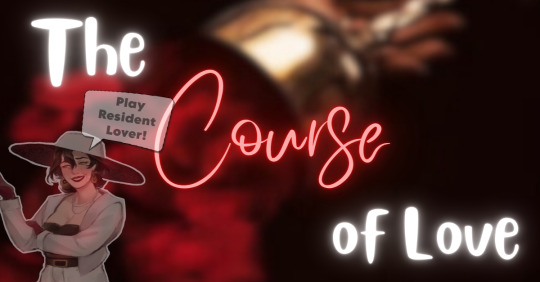
Ignore the low-quality edit. It has become a ritual for me.
The full work will be posted later on ao3. When? Great question...
#resident evil#resident evil village#resident lover#lady dimitrescu#alcina dimitriscu x reader#ao3 fanfic#sapphic#current wip
27 notes
·
View notes
Text
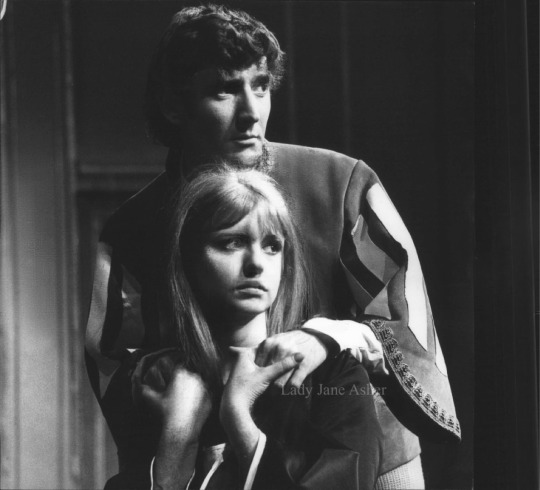
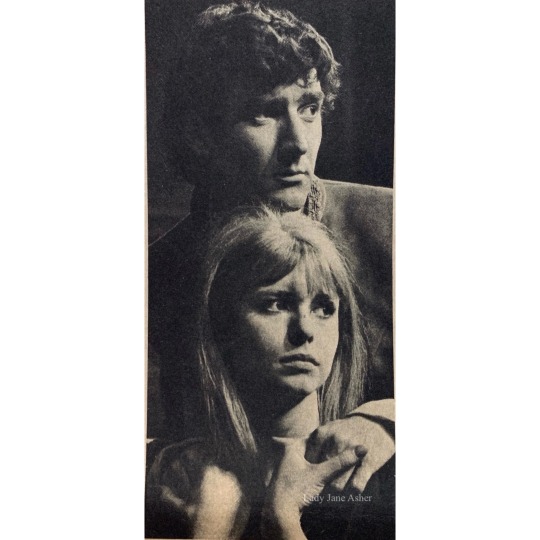
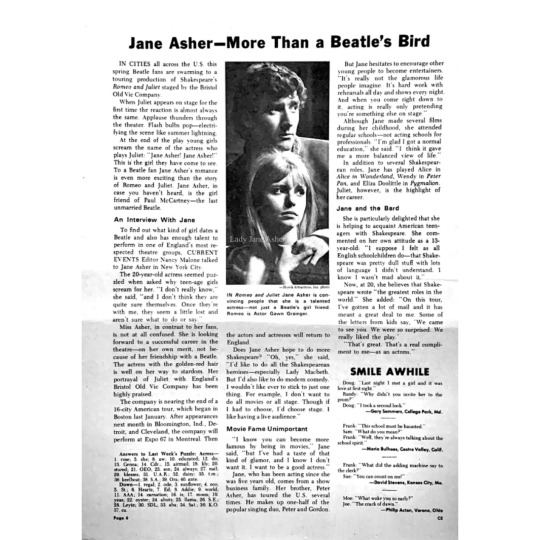
April 5th 2024, happy beloved 78th birthday to the one and only Jane! She’s been my inspiration for around 12 years since I first discovered about her. It’s been a wonderful journey getting to share new pictures I find, my scans, colourisations and accurate information in regards of the pictures I found. May I be able to meet her one day. 🤍
This post will be divided in two, as the picture shown was used for two different newspapers that I scanned therefore the subtle mark on the photos. And you might have seen the photos with my old username so I am sharing them with the new one!
Jane Asher and Gawn Grainger as Juliet Capulet and Romeo in “Romeo and Juliet” presentation while being on tour in the USA, 1967.
First picture is my edition and enhancement from historical picture auction scan, second one is my scan from the newspaper, and third one is the scan of the newspaper.
Jane Asher-More Than a Beatle's Bird
In cities all across the U.S. this spring Beatle fans are swarming to a touring production of Shakespeare's Romeo and Juliet staged by the Bristol Old Vic Company. When Juliet appears on stage for the first time the reaction is almost always the same. Applause thunders through the theater. Flash bulbs pop—electrifying the scene like summer lightning. At the end of the play young girls scream the name of the actress who plays Juliet: "Jane Asher! Jane Asher!" This is the girl they have come to see. To a Beatle fan Jane Asher's romance is even more exciting than the story of Romeo and Juliet. Jane Asher, in case you haven't heard, is the girl friend of Paul McCartney-the last unmarried Beatle.
An Interview With Jane
To find out what kind of girl dates a Beatle and also has enough talent to
perform in one of England's most respected theatre groups, CURRENT EVENTS Editor Nancy Malone talked to Jane Asher in New York City. The 20-year-old actress seemed puzzled when asked why teen-age girls scream for her. "I don't really know," she said “and I don’t think they’re quite sure themselves. Once they’re with me, they seem a little lost and aren’t sure what to do or say”.
Miss Asher, in contrast to her fans, is not at all confused. She is looking the forward to a successful career in the theatre—on her own merit, not because of her friendship with a Beatle. The actress with the golden-red hair is well on her way to stardom. Her portrayal of Juliet with England’s Bristol Old Vic company has been highly praised. The company is nearing the end of 16-city american tour, which began in Boston last January. After appearances next month in Bloomington, Ind., Detroit, and Cleveland, the company will perform at expo 67 in Montreal. Then the actors and actresses will retur to England.
Does Jane Asher hope to do more Shakespeare? "Oh, yes." she said, “I'd like to do all the Shakespearean heroines-especially Lady Macbeth. But I'd also like to do modern comedy. I wouldn't like ever to stick to just one thing. For example, I don't want to do all movies or all stage. Though if I had to choose, I'd choose stage. I like having a live audience.
Movie Fame Unimportant
"I know you can become more famous by being in movies,", Jane said. "but I've had a taste of that kind of glamor, and I know I don't want it. I want to be a good actress." Jane, who has been acting since she was five years old, comes from a show business family. Her brother, Peter Asher, has toured the U.S. several times. He makes up one-half of the popular singing duo Peter and Gordon.
But Jane hesitates to encourage outer young people to become entertainers. "It's really not the glamorous life people imagine. It's hard work with rehearsals all day and shows every night. And when you come right down to it, acting is really only pretending you're something else on stage." Although Jane made several films during her childhood, she attended regular m schools—not acting schools for m professionals. "I'm glad I got a normal education," she said. "I think it gave me a more balanced view of life. In addition to several Shakespearean roles, Jane has played Alice in Alice in Wonderland, Wendy in Peter Pan, and Eliza Doolittle in Pygmalion. Juliet, however, is the highlight of her career.
Jane and the Bard
She is particularly delighted that she is helping to acquaint American teenagers with Shakespeare. She commented on her own attitude as a 13-year-old: "I suppose I felt as all English schoolchildren do-that Shakespeare was pretty dull stuff with lots of language I didn't understand. I know I wasn't mad about it." Now, at 20, she believes that Shakespeare wrote "the greatest roles in the world." She added: "On this tour, I've gotten a lot of mail and it has meant a great deal to me. Some of the letters from kids say “We came to see you. We were so surprised. We really liked the play.” “That’s great. That’s a real accomplishment to me —as an actress”.
#jane asher#the beatles#60s#beatles girls#actress#lady jane asher#something about jane asher#model#beatles women#1967#romeo and juliet#redhead#red hair#vintage#1960s
13 notes
·
View notes
Note
hi avo!! not a request, but in honor of spooky month, i would like to bring up the idea of whether crowley or aziraphale have ever dressed up for Halloween :o idk if crowley would but i feel like aziraphale definitely has at least once (i think he’d enjoy the seasons festivities or just love the fact that he can dress up) but i was thinking abt this and maybe it’s too on the nose but the idea of him dressing up as cupid (the angel of love) is just soooo 😫😫 like he would be so cutesy and adorable and crowley would just be like “cmon rly, angel 🤨 wow so creative” but he would secretly be enjoying it so much cuz he looks so good [bonus points if nightingale also dresses up]
and now -bc the brain rot is never ending- im wondering what a halloween episode would be like,, like im envisioning them being at the bookstore and ppl stopping by to trick or treat and crowley being so over it but aziraphale is loving the holiday activities just enjoying the spirit and other ppls costumes 🎃🎃
aziraphale as Cupid 💘 😭 so cute. he gets the robe (which he has experience pinning from his time in rome) and a little pair of wings. you help him put in a bit of makeup too 😌 he loves his face being held in your hands as you pamper him. he’s not super into the idea of Halloween but he knows the local children love it and he always hands out full sized chocolate bars.
you like to dress up too, it’s a bit of fun. Go through your own wardrobe and see what you can pull out. “Shakespearean heroine” or “dashing pirate” are easy favs.
Crowley puts on a pair of devil horns or cat ears and calls it a day lol.
Then just before bedtime you all watch a scary movie and aziraphale is loudly terrified and Crowley is quietly terrified… you’re the only one who doesn’t jump so they cuddle into you 😌
11 notes
·
View notes
Text
I think the reason why I'm so fascinated with LP Jennette is because she is raised inside a constructed narrative. Roger and Rosalia created conditions under which becoming the crown princess is the only reality she can see, maybe the only one possible.
Nothing inside her was not created by them. Her father wonders which parent she resembles. The answer is none. Jennette was raised to seek out Claude - to seek his love. But only because no one at home gave her that strong bond that is, ‘familial love’. Without them (without love) she feels useless. The reason why Jennette's personality feels flat is because she wasn't allowed to develop her personality organically. Her yearning for love, her romantic idealism, her naivety are all traits that nurtured in her by the Alpheus/Judiths. Her personality feels artificial and fake to some readers because her personality was modelled after a classic Cinderella stereotype. Storybook princesses aren't allowed to have any flaws. Or any depths.
Children are smart, much smarter than adults give them credit for. Jennette does what Roger wants because deep inside him she senses that he wants something from her. I think Jennette realized early on that Roger isn't the type of person that would be taking care of an orphan like her out of the pure kindness of his heart. She feels a debt towards her caretakers that she has to pay. Her total obedience might not only be the result of her isolated/sheltered childhood in which Roger and Ijekiel were her only source of warmth, but also the result of her wanting to show gratitute and the fear of disappointing him and losing everything. And when I say everything I mean everything. Ijekiel won't marry a nobody like her if she isn't accepted into the royal family and can guarantee he becomes Emperor consort. If she cannot give Roger what he wants, if she won't become the crown princess then she would be nothing but a disappointment, a waste of time, a failed project. Would he cast her aside? Who knows. She'd even lose the small scraps of affection on which she survived since childhood. There is no future for her except for the one in the Imperial palace. If a cruel and bloodthirsty tyrant like Claude won't accept her as his daughter what other ending would await her except for death? Especially novel Jennette who knew she was not Claude's real daughter had no choice but to uphold this lie lest she be executed for being the child of her cheating mother and Claude's dead brother.
When she rejects the throne and says she only cares about her family she is punished by the narrative and loses the only thing she cares about: her family. I think what differentiates Jennette from other heroines the most is that she is forced onto the throne against her will. Her life is a tragedy disguised as a happy ending. Her wishes are granted in a very monkey pawn kind of way. She gets her father's love but her sister gets his scorn and is executed. She gets the throne but for that her father has to die. She ends up marrying the most desired man in the entire Empire but it is the boy who was her foster brother and saw her as nothing but a family, who she was never allowed to see as a family since Roger always intended for her to marry him. LP Jennette has no real personality or wants or dreams. I think it was always other characters projecting on her or doing terrible things for her sake, for what they think will make her happy without asking for what she really wants.
I love the concept of the A Lovely Princess novel. It looks like a tacky romance novel but actually hides a shakespearean tragedy underneath with the heroine secretly being the daughter of the villain and killing her own family unknowingly throughout the novel. Jennette is introduced as a cliché of a heroine when in reality she would have been the most interesting heroine ever. She isn't an overpowered genius, doesn't even want to rule. Even though she is a designated heroine and destined for the throne in her own story she doesn't even have the name of immortality that is meant for the heir.
The side character Athanasia had originally all three things: the Imperial blood, the Imperial magic and the Imperial mana but she is killed off screen. Jennette is loved by everyone except she's not. She is surrounded by people who either envy her, want to use her or are brainwashed by her magic. The people that claim to love her the most are actually unbelievably selfish and do the most unhinged things in her name. Like poisoning her and framing someone innocent just to make sure she will be the only in line for the throne when she has never expressed an interest in ruling. It's just very interesting how these people who claim to care for her consistently ignore her wishes for what they think will make her happier and only make her more miserable in process.
I'd love to read a oneshot that is sort of an epilogue of the Lovely Princess. How does Jennette cope with the loss of her loved ones and the truth that her family is partly responsible for that? What kind of Empress will she become? How can she survive the court intrigues without Claude's protection?
94 notes
·
View notes
Text
The Little Mermaid (1989)
🧜♀️🦀🐠
Based on the Danish fairy tale by Hans Christian Andersen, this animated classic from Walt Disney Pictures is about a beautiful teenage mermaid named Ariel who dreams of becoming part of the human world against her father’s wishes.
The voice cast includes: Jodi Benson as Ariel, Christopher Daniel Barnes as Ariel’s human love interest Prince Eric, Kenneth Mars as Ariel’s father and ruler of the merfolk King Triton, Pat Carroll as a scheming, powerful sea witch named Ursula, Samuel E. Wright as Jamaican crab/court composer Sebastian, Jason Marin as Ariel’s best fish friend Flounder, Buddy Hackett as Ariel’s seagull friend and “human expert” Scuttle and Paddi Edwards as Ursula’s moray eel minions Flotsam and Jetsam.
Jodi Benson (an honorary legend known for her work in this film and other Disney projects such as Flubber, Enchanted and the second and third Toy Story movies) has delighted generations of Disney fans with an astonishing vocal performance that conveys a sense of charm, spunk and naïveté to a mythological heroine. In a way, those distinctive qualities can make anyone fall in love with Ariel. Pat Carroll is extremely talented to the extent that her voice alone is sufficient to bring an irresistible sense of awe and wickedness to the table. Samuel E. Wright is quite the professional stage actor, which easily complements his animated crustacean going from royal advisor to romantic adviser.
In contrast to the ancient, nameless characters of Hans Christian Andersen’s tale, this particular film enhances its character with modern techniques equivalent to real-life experiences. For example, Ariel is a growing teenager tired of being treated like a kid by her overly protective father, thus she is willing to leave home to seek out her heart’s desire. This particular aspect gives viewers a fresh look at the relatable circumstances of a troubled relationship between parent and child (something that was rarely depicted in earlier animated films during Walt Disney’s lifetime). Ursula on the other hand represents a former Shakespearean actress who not only turns to dark magic, but has practically become a shady dealer in the process of trying to work her way back to the top. Ariel’s aquatic sidekicks (Flounder and Sebastian) are exclusively included to add light and humor to an otherwise tragic (and slightly disturbing) work of literature.
The original fairy tale is somewhat similar to the personal life of Hans Christian Andersen in terms of yearning to belong in a completely different world, even if it comes at a price. In Andersen’s case, he was literally a fish out of water in society, hence his desire to express change in identity and the unfairness of social class through fictional storytelling. In Ariel’s case, she strikes a deal with Ursula to receive a pair of human legs, though the price she has to pay the sea witch in return is her voice. Furthermore, if Ariel succeeds in winning Prince Eric’s affection through true love’s kiss, she will not only become a permanent human (and regain her voice), but she can never be with her water-dwelling family again. Meanwhile, Ursula plots to possess Ariel’s soul and dethrone Triton as ruler of the ocean, whereas Andersen’s version of the sea witch had no evil intentions whatsoever.
The traditional Disney animation doesn’t just make every underwater scene look scientifically authentic (especially the formation of bubbles, rippling light pattern, the movement of Ariel’s drifting hair and flexibility of Ursula’s tentacles), but Ariel’s girlish looks are inspired by Charmed actress Alyssa Milano, while Ursula’s physical appearance is loosely inspired by drag queen performer Divine. What’s more, a violent storm (during which Ariel rescues Eric from drowning) is shown as described in Andersen’s original story accompanied with some pretty amazing technical effects.
The soundtrack contains a mixture of Broadway, Calypso, pop, show tune and reggae music composed by Alan Menken (whose contribution to this film led to his continuation as composer of other Disney works up to the present time) and memorable songs written by the legendary Howard Ashman. The track list includes: “Fathoms Below”, “Daughters of Triton”, “Part of Your World” (a power ballad that serves as the film’s “I Want” song and occasionally performed in concert by Jodi Benson), “Part of Your World (Reprise)”, “Under the Sea” (an upbeat song Sebastian sings to try to convince Ariel of the joys of underwater life, which won the Oscar for Best Original Song), “Poor Unfortunate Souls” (a hair-raising number sung by the villain whose lyrics are enticingly deceptive), “Les Poissons” (which occurs when Eric’s crazed chef tries to cook Sebastian), “Kiss the Girl” (where Sebastian orchestrates a romantic atmosphere to encourage Eric to kiss the voiceless girl who is indeed the one) and “Vanessa’s Song” (specifically the scene where Ursula is preparing to marry herself to Eric using both her human disguise and Ariel’s voice).
Finally, other than the fact that this particular version of The Little Mermaid heralded the arrival of a new golden age of traditionally animated movies known as the Disney Renaissance, the central theme of the story is focused on love crossing boundaries and the importance of self-expression. All in all, I enthusiastically recommend this gorgeous, captivating film that really has made a splash.
#disney#disney renaissance#the little mermaid#animation#ariel#jodi benson#hans christian andersen#the little mermaid 1989
19 notes
·
View notes
Text
lucy westenra is so. she’s so. character of all time. she has three boyfriends who have all injected their blood into her and she’s getting chomped on nightly by a vampire and every single entry we get from her til the bitter end is so full of hope for herself and everyone around her. she’s the girl who strew her mother’s corpse with the flowers that were saving her life. she compares herself on several occasions to tragic shakespearean heroines. she’s so endlessly gentle and forgiving and hopeful and clever. it’s so important to me that we remember she did not ask for any of this - not to be stalked by dracula, and not to be saved, either. she was going to be married in a week. she was so good and so full of love, both hers and others, and it pumped in her literal veins and it was drained from her.
#lucy westenra has been tearing around in her fucking nightgown 24/7 sylvia plath and hope is a dangerous thing for a woman like her to have#but she has it anyway#i love her so much#dracula
9 notes
·
View notes
Note
Who are the greatest characters in all of literature?
(Sub-questions: Best characters in Shakespeare? Do you agree with Bloom's sextet of Hamlet and Falstaff first equal, followed by Macbeth, Rosalind, Cleopatra, and Iago?)
It's an interesting question, because there essentially are no "characters" exactly before Shakespeare. People act scandalized by Bloom's "invented the human" line, but he's transparent about deriving it from Hegel, and it's not that different from the academically respectable New Historicist thesis on "Renaissance self-fashioning."
Before Shakespeare—and then after Shakespeare but only in popular fiction—there are myths and archetypes to whom a few stable characteristics attach but who are available for reinvention and recirculation, an infinitely malleable legendary surface without inherent psychological depth: Prometheus or Odysseus, Arthur or Roland, Count Dracula or Sherlock Holmes.
On the other hand, the type of modernity inaugurated by Shakespeare—and then passing from him into Romanticism, realism, and modernism—gives us the character of bottomless, labyrinthine depth rather than an iconic or archetypal but flat figure: tragic heroes like Hamlet, Milton's Satan, Goethe's Faust, Captain Ahab, and the Brothers Karamazov, or more strictly novelistic figures like Emmas Woodhouse and Bovary, Hester Prynne, Anna Karenina, Isabel Archer, Clarissa Dalloway. And then, reuniting the novel to the epic, the character to the archetype, perhaps the 20th century's greatest literary character: Leopold Bloom.
(Honorable mention for accomplishing the same synthesis as Joyce but from the other direction: Ursula Brangwen. If Joyce tailors a Homeric hero to Flaubertian proportions, Lawrence turn an Austen heroine into a Biblical prophetess.)
Best characters in Shakespeare: I do mostly agree with Bloom (Harold, not Leopold). I love Falstaff less than he does, though; there's a meanness or squalor in Falstaff he doesn't seem to see. I would also replace the bewildered Macbeth with the raging Lear, and I might add Prospero to our roll call, since he is (I fancy) the closest thing we have to a Shakespearean self-portrait.
2 notes
·
View notes
Text
I’ve got so much hurt inside this little body that I feel like a tragic Shakespearean heroine
2 notes
·
View notes
Text
@ivynighteyes and i made a uquiz and i think it should count towards my english A level
18 notes
·
View notes
Text
The heart-rending expression of a boy-player’s female corpse begins a tradition still prevalent in Shakespearean performance: a Shakespeare heroine smothered in her bed does not look like a bruised, violated victim disfigured by petechiae, bleeding lips and burst blood vessels, but like an attractive young woman lying with her eyes shut.
9 notes
·
View notes